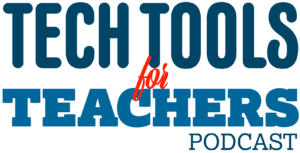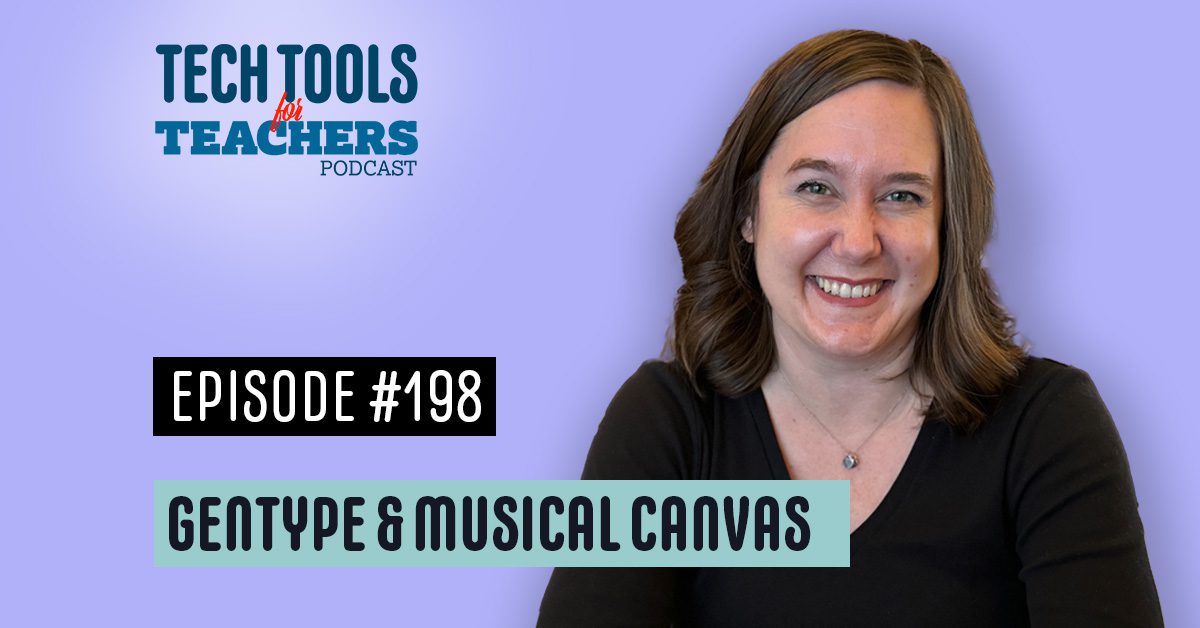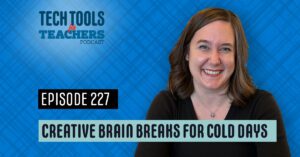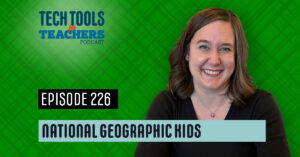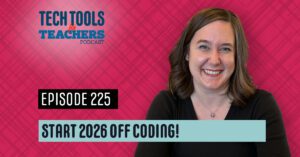[00:00:00] Shanna Martin: Thanks for listening to the Tech Tools for Teachers podcast, where each week we talk about a free piece or two of technology that you can use in your classroom. I’m your host, Shanna Martin. I’m a middle school teacher, technology and instructional coach for my district.
[00:00:32] Fuzz Martin: And I’m her producer and husband, Fuzz Martin, and I’m not the type to read the titles before we start podcasting.
Oh, I had a really good joke in it. Thanks It fell short because I
[00:00:45] Shanna Martin: didn’t read.
[00:00:45] Fuzz Martin: I skimmed, and then, yeah. Um, so anyway, hello. Hi. How are you? Episode 198.
[00:00:52] Shanna Martin: Episode 198.
[00:00:53] Fuzz Martin: We’re getting closer.
[00:00:54] Shanna Martin: We are.
[00:00:55] Fuzz Martin: To the 200 mark.
[00:00:57] Shanna Martin: Woohoo.
[00:00:57] Fuzz Martin: The sesquicentennial.
[00:00:59] Shanna Martin: Yeah.
[00:01:03] Fuzz Martin: Hooray! Hooray!
[00:01:04] Shanna Martin: We’re like, finishing, we’re like charging towards the holidays here. It is crazy. It is crazy. We’re almost done with the year of 2024.
[00:01:16] Fuzz Martin: Yeah.
[00:01:17] Shanna Martin: It’s nuts.
[00:01:17] Fuzz Martin: Mm hmm.
[00:01:18] Shanna Martin: So this week we have two very entertaining sites to talk about. And. I know you were so excited to talk about them that you totally skipped the title round, and it’s cool.
[00:01:34] Fuzz Martin: I did.
[00:01:34] Shanna Martin: You’re human.
[00:01:35] Fuzz Martin: I am human.
[00:01:36] Shanna Martin: And I can’t wait to see what you create with these, so I’m sure it’s going to be interesting. I’m
[00:01:40] Fuzz Martin: going to create all of the stuff.
[00:01:42] Shanna Martin: Alright, so, we have two different websites.
[00:01:48] Fuzz Martin: Yes.
[00:01:48] Shanna Martin: Gentype and Musical Canvas. And they actually, they kind of, they’re very different, but my reasons for liking them are very similar.
So, both of them are super fun. Like, they’re fun to play around in. They’re, they’re just entertaining. You get to be creative, which we always appreciate. They can be used to present information in very different ways. And I’ll kind of talk about that when I talk about each site. Like, it would be a way to share information or for students to kind of share their knowledge.
You could use it that way, or you could use like something completely different. They have, both of them have uses definitely outside of the classroom. Like you, these are not necessarily built for classroom tools. They are just, they’re AI based kind of generation tools, and you could use them in your classroom, or on your own, or for your entertainment’s sake, when you’re like, I just, your brain is gone, and you just need a break.
They offer a different way to be creative. Both of them are kind of obscure ways to be creative and not like a predictable way, which I appreciate. And you can share them both with others. So once you make your creations, you can easily share them out, which is pretty cool. Part of the fun of creating these things.
So the first one I’m going to do is Musical Canvas. Oh, okay. Are you ready for the other one?
[00:03:03] Fuzz Martin: Oh, I mean, yeah, we’ll go to Musical Canvas.
[00:03:06] Shanna Martin: So Musical Canvas, eh, you’ll find it in Google Arts and Culture. I linked, I’ll link it in like the website, but Musical Canvas, you can just type in Musical Canvas. Canvas, anywhere.
You launch the experiment and what’s cool about it, it does run through Google Arts and Culture and basically you have your little tools. So you have a little drawing box where you have a paintbrush or you have like a little like dots, like that makes polka dots. And we all know how much I love a polka dot.
And so you can polka dot and you can draw. And you can create a piece of art. So you can take your time drawing, or honestly, you can just put some scribbles on there and then fill it. And so I have some purpley polka dots and some darker purple zigzaggy lines and a couple of red squiggly lines through my image.
You can choose the size. You can make your, like, end larger or smaller, whichever you choose. There are filters on there so you can blur it a bit, or you can pixelate it a bit if you choose to. You can make it look like old film. You can just add some different like backgrounds to it and you create this beautiful piece of digital art, whatever it may be.
I’ll screenshot this and put it on my website so you can see this beautiful piece of art I just made. So then you click generate music and there’s a cute little emoji guy. On the right hand side of your screen and says, this music piece, I am now going to do live generation directly inspired by this masterpiece.
Uh, it’s decided that my music should be slow and peaceful. It tells me that my image is relaxing and calming, which is funny. It’s kind of spazzy. And then it makes a song based on what you have created. And overall, it tells you about like your fun piece of digital art.
[00:05:00] Fuzz Martin: Yeah.
[00:05:01] Shanna Martin: And then. Tell me more.
And so, it’s just like a fun way to create a piece of music. And then I was thinking, so if I had students doing research project, or if I have them doing inquiry piece. They could generate a piece of art to go with it, you know, like inspiration, like from the background or whatever, the research, or maybe a piece of art, generated by whatever it may be.
But what’s cool then is you can share it directly. So they have a very easy to use share button and you can copy the link directly, which then technically you could turn into a QR code. So then the piece of music could be QR coded to whatever project they created. So there’ll be music that went with their creation, but also you can drop it directly into Google Classroom.
So it does have the option to direct, directly drop your, your music, your art music piece directly into Google Classroom, along with like sharing on email and social media and stuff. The little guy like tells you why. So like the use of bright colors creates a sense of optimism and joy. Like it, it goes through like little descriptive.
Pieces as to why the image created that sound.
[00:06:14] Fuzz Martin: Yeah, that’s, yeah, that’s really cool.
[00:06:16] Shanna Martin: It’s really fun to play with. And I thought what a cool way for kids to get other kids who may not be super excited about presenting information into maybe like this is a piece of music that I wrote based on this drawing that I did that’s inspired by.
You know, photosynthesis or something.
[00:06:37] Fuzz Martin: I’m trying to, I, unfortunately I’m, cause I’m colorblind. I’m trying to make a red background, but I cannot find red to save my life on the screen.
[00:06:44] Shanna Martin: Oh, it’s in
[00:06:45] Fuzz Martin: the middle. In the middle. So one,
[00:06:48] Shanna Martin: two, three, four, five, six columns over this red down the center.
[00:06:53] Fuzz Martin: Okay. There we go.
[00:06:54] Shanna Martin: Okay, cool. So it goes like teal. To green and reds in the center. Thank you. You’re welcome.
[00:06:59] Fuzz Martin: Thanks Google for being, very.
[00:07:02] Shanna Martin: Not aware. But yeah, so the whole thing is to draw on a digital canvas and it uses like these different visual effects. And the whole goal is to like make, create your own soundtrack based on your piece of art.
And it’s just, it’s a really a cool thing to play around with. And like I said, you could link it to a QR code so kids could write, like, have their art and their music together. They could share in Google Classroom. You could do it as Brain Breaks and build it in that way. You could just make it a part of, even music class, being aware of, like, sound waves and how sound affects people or the impact of that.
Also be a great, like, SEL lesson. Like, how Do these different colors make you feel and how does that connect to different sounds and how does that, you know, impact things? So there’s just different ways that you could build musical Canvas into your classroom and let kids play around with it. Whether it’s specifically for a content area or just for something kind of creative to do and let their minds create for a bit.
I think it’s pretty cool.
[00:07:59] Fuzz Martin: I’m excited to see what this one creates. It’s because I made a pattern that looks like Charlie Brown’s sweater. I want to see if it makes, uh, Charlie Brown music. I don’t think it will. I think it’s going to sound like rock music. Oh,
[00:08:14] Shanna Martin: yeah. Not Charlie Brown. No, more anime. Yeah.
Yeah.
[00:08:22] Fuzz Martin: That’s kind of fun. That is
[00:08:23] Shanna Martin: fun.
[00:08:23] Fuzz Martin: Yeah. I think kids will dig this for sure.
[00:08:25] Shanna Martin: Yeah. As, as do you.
[00:08:29] Fuzz Martin: Yeah. Yeah. That’s fun.
[00:08:32] Shanna Martin: Yeah.
[00:08:32] Fuzz Martin: That might be more fun than the other one that I was playing with earlier. So you didn’t realize
[00:08:35] Shanna Martin: I had two super fun sites to talk about
[00:08:37] Fuzz Martin: this week. That is really fun.
[00:08:39] Shanna Martin: Yeah. So check it out.
That one is called Musical Canvas. And for those of you that do like blob beats and blob opera, I would add this one to your repertoire of and there’s a bunch of kids playing around with some music, with their kiddos. So there’s that. Okay. Okay. So our second site of excitement and fun and creativity is called gen type.
And see, you were really excited about this one. And now, now you’re excited about the other one too. So gen type is.
[00:09:10] Fuzz Martin: I mean, this one, the one I created on this one, it’s really cool.
[00:09:14] Shanna Martin: GenType is coming from labs. google, which I talked about a bit last season, different experiments that they do with AI and basically.
You type in what you want. Mm-Hmm. to see. And gen type generates a font of the entire alphabet based on your description. So, before I typed one in, that was books, like a library on bookshelves in the classroom. Yep. And my whole alphabet was made. with library books. And then you can go and you can adjust them if you want some to match., cause they give you a variety of this. So this time I’m going to type in,
[00:10:03] Fuzz Martin: uhm, podcasting microphones.
I, I, I did, uh, I did candy canes on top of, uh, fluffy cotton.
[00:10:09] Shanna Martin: Oh, fun.
[00:10:10] Fuzz Martin: Yeah, for the holiday season.
[00:10:12] Shanna Martin: That is fun. And what, this is something that another, like when you were playing around with this and teaching your kids, prompting AI again, we kind of talked about it last week. You have to be specific with what you actually want it to say, or what you’re looking for.
So if they prompt specifically, they’ll have a more specific alphabet. So it takes, this one’s a little slower, not like super slow, but you gotta give it 20 seconds or so to create your font.
[00:10:38] Fuzz Martin: It’s creating 26 different images, so you gotta wait.
[00:10:40] Shanna Martin: Yeah, so it takes a second. And, they also give you some, examples down below, too, that you can see that other people have created before.
And once the alphabet is created, it’s cool, because you can download it, you can save it as a PNG file, and you can download your alphabet. So once it’s created, you can then use it. So I was thinking, if students are creating presentations They can, have their intro slides created with a font that matches the theme of whatever they’re presenting for information.
Or if you have like a parent night coming up and you have slides that you’re creating, I’m, I’m, I have to create a lot of slideshows for professional development and things like that. I’m always looking for different ways just to make them entertaining.
[00:11:19] Fuzz Martin: Yeah.
[00:11:20] Shanna Martin: But I now have a. Letter set of full alphabet of letters made with podcasting, mics and speakers, which is pretty cool.
And then if you choose to, if there’s one that you really like, or you don’t like, you can click on that letter and then click the regenerate and it will adjust it for you. So like, I didn’t really like my letter H cause the background was different than my other ones. So I clicked it and it cleaned up the background and made it slightly different.
So now that one looks a little bit different. So there’s all these different ways that you could use like a cool font for, you know, different projects, presentations, information, posters. Yes, you look very excited over there.
[00:12:05] Fuzz Martin: Google, you know, they give you like sample prompts.
[00:12:07] Shanna Martin: Yes.
[00:12:08] Fuzz Martin: Google must be listening to me because Well, obviously.
Because, the sample one they gave me was lawnmower path, green lawn, aerial photo, and it’s all alphabet It’s our lawn!
[00:12:21] Shanna Martin: It’s all
[00:12:21] Fuzz Martin: alphabet made out of lawn stripes.
[00:12:23] Shanna Martin: Oh, cool. Which
[00:12:25] Fuzz Martin: is pretty cool.
[00:12:27] Shanna Martin: That’s fun.
[00:12:29] Fuzz Martin: So,
[00:12:29] Shanna Martin: so yeah, so GenType gives you so much flexibility with creating your own, your own alphabet and you’re able to adjust it and then use it.
And like I said, for presentations or for, sharing information, posters, parent letters, any of those communication pieces that you want to jazz up a little bit, or my other thought was like, if you have students that are putting on a production or a play or a Christmas concert or a fall musical or whatever it may be.
You could type that in and then use that as the, like, You can take the style or the, you know, the style, the label or the, you know, different things and you can make it match the theme of whatever you’d like to.
[00:13:11] Fuzz Martin: Or if you’re creating a ransom letter.
[00:13:16] Shanna Martin: Or not, probably not, maybe a mystery font. Good grief. So,
gen type through Google Labs has just all kinds of fun ways to do things. And create these cool alphabets that you can download and create and then do something fun with. So, check that out.
[00:13:42] Fuzz Martin: God bless you.
[00:13:43] Shanna Martin: Thanks. So, if you’re going to use it with your students, that would be a cool thing. Or just as a teacher, you could use it as a cool way to jazz up the information that you have to share with people all the time.
Check it out.
[00:13:55] Fuzz Martin: Check it out. Gentype. So labs. google slash G E N T Y P E. Labs. google slash Gentype.
[00:14:05] Shanna Martin: So there you go. Musical Canvas, Gentype. Both so much fun to play around with and create with and make new fun things with. I’m so excited. Yeah,
[00:14:15] Fuzz Martin: it’s very fun. Um, I, uh, I don’t even know. Oh, I don’t even know which one was more fun at this point.
Uh,
[00:14:23] Shanna Martin: And now you’re distracted by both. I am, I
[00:14:25] Fuzz Martin: am. I’m going to use one to create things for the other.
[00:14:30] Shanna Martin: Perfect.
[00:14:31] Fuzz Martin: I’m create a musical album with, the first one, which is called what again? It doesn’t say on the actual thing. Musical Canvas. Musical Canvas. And then I’m going to, create my album cover using GenType.
[00:14:45] Shanna Martin: All right.
[00:14:46] Fuzz Martin: So. That’s going to be,
[00:14:47] Shanna Martin: can’t wait to see how that turns out.
[00:14:50] Fuzz Martin: It’s going to be loads and loads of fun.
[00:14:53] Shanna Martin: Nice.
[00:14:53] Fuzz Martin: Well,
[00:14:55] Shanna Martin: thanks for tuning in. This has been the Tech Tools for Teachers podcast. If you ever have any questions, you can find me on X at smartinwi or on Threads or on Facebook, and if you want to get more information on the links to the technology discussed in this episode, you can visit smartinwi.Com. If you’d like to support the show, please consider buying me a coffee or two. Visit buymeacoffee. com slash smartinwi or visit smartinwi. com and click on that cute little purple coffee cup. Your donations help keep the show going. I’ll be seeing a few of you at Slate coming up because that’s happening here soon.
New episodes each week. Thanks for listening. Go educate and innovate.
[00:15:35] Fuzz Martin: The ideas and opinions expressed on this podcast and the smartinwi.com website are those of the author, Shanna Martin, and not of her employer. Prior to using any of the technologies discussed on this podcast, please consult with your employer regulations.
This podcast offers no guarantee that these tools will work for you as described, but we hope they do. And we’ll talk to you next time on the Tech Tools for Teachers podcasts.
